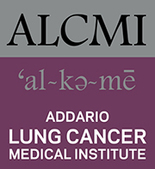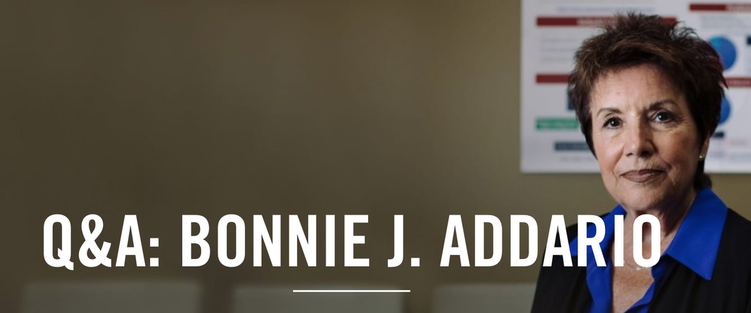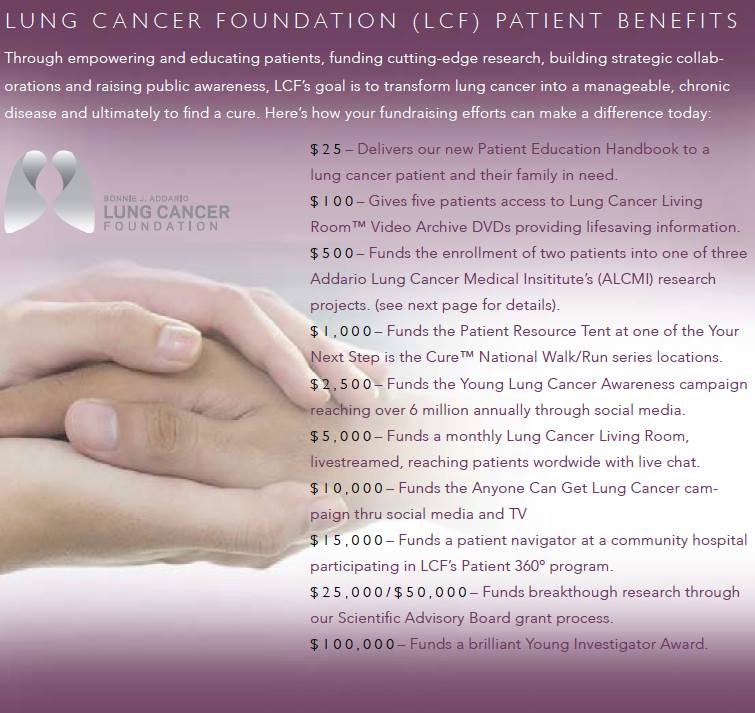|
We are about halfway through Lung Cancer Awareness Month and I would like to offer some information about a fantastic organization. If you are reading this, you likely know about this group. But, even if you do, I encourage you to sit back with your favorite beverage and take a few minutes to watch the video at the end of this post. When supporting any cause or charity with a financial gift, prudent questions are “Where does the money go?”, “How effective is the organization?”, “Is it worthy of my support?”, "What are they doing?", "What have they done?" I ask these questions myself before choosing to financially support any charitable cause. This video, narrated by their Senior Director of Patient Services and Programs, Danielle Hicks, does an excellent job of answering these questions for The Bonnie J. Addario Lung Cancer Foundation (ALCF). My family and I met the Addarios shortly after our mother died in 2007. We were immediately struck by their sincerity, warmth - and tenacity. But, we were also impressed by their team and how they were attacking the lung cancer problem with intelligence and professionalism. In 2010, The Joan Gaeta Lung Cancer Fund proudly became an affiliate of ALCF. And, since 2012, those of you in Georgia have been able to order Lung Cancer Awareness License Plates - a first in the United States. 85% of the annual tag fee goes to ALCF’s research institute. You can also donate directly to ALCF via this link. Please to watch the video and consider a donation during this important month. Thank you, Joseph A. Gaeta The Joan Gaeta Lung Cancer Fund
0 Comments
We cannot think of a better way to kick of Lung Cancer Awareness Month 2016 than with this excellent Q&A with a leader in the movement - and our friend - Bonnie Addario. Please read this inspirational and informative interview from Genentech: https://www.gene.com/stories/qa-bonnie-j-addario
4/14/2015 NavigateLungCancer.org: A New Online Toolkit Now Available to Help People Living with Lung CancerRead NowOriginally published by Brandpoint (BPT) on Monday, April 13, 2015 12:00 am A lung cancer diagnosis may bring up a variety of difficult emotions, and navigating the next steps involved in daily life can be especially overwhelming for patients and their loved ones. Emotions may range from anger at the loss of control and uncertainty about medical decisions to fear about what happens next. And these feelings may be coupled with the fact that when patients and their families go online to learn more, they see discouraging statistics on incidence or complex medical information, when what they really need is help dealing with the impact of lung cancer on their lives and emotions.
As hard as a lung cancer diagnosis can be, there is support and practical information available on NavigateLungCancer.org to help lung cancer patients and their loved ones during the days ahead. The website was designed to be a comprehensive, go-to resource supporting the lung cancer community holistically, providing practical, day-to-day information that goes beyond their diagnosis. In developing the site, Bristol-Myers Squibb partnered with seven leading patient advocacy organizations to ensure it would provide the type of logistical, financial and psychosocial resources that are needed and meaningful for the lung cancer community. "NavigateLungCancer.org will allow patients and caregivers to spend more time focused on the path forward and less time figuring out the next step,” said Bonnie J. Addario, Founder and Chairman of the Bonnie J. Addario Lung Cancer Foundation. “A lung cancer diagnosis comes with a whole new set of day-to-day challenges and we've collaborated with other cancer organizations and stakeholders to collect nutritional, financial, organizational or even physical assistance services in one place and make it available for patients and their families.” In addition, the site offers interactive resources that may help manage living with lung cancer and the impact on everyday activities, including the interactive “The Road Ahead” and “Personal Journal” tools. The Road Ahead Considered a simple guide for patients and their families to find the right resources at every juncture in their lung cancer journey, “The Road Ahead” includes an overview of organizations offering financial assistance for everyday activities, such as house cleaning, transportation services, fuel costs and meal delivery programs. Visitors can also find valuable information to address legal and financial concerns and community support groups. A Personal Journal Many faced with a lung cancer diagnosis need an outlet to articulate their emotions during a challenging and uncertain time. An online and downloadable “Personal Journal” tool allows patients and caregivers to record their hopes and fears via a series of questions developed by oncology social workers. Visitors who sign up to receive email updates from the website will also be mailed a treatment journal to keep track of appointments and capture thoughts and feelings. Visitors to the site can also download educational assets and register to receive emails with helpful tips and supportive messages about what you or a loved one might be going through. Beyond being a resource for patients and caregivers, the site is also optimized for nurses, providing educational videos that may allow them to learn more about lung cancer patient needs from patient advocacy groups and research in the field from clinical trial institutions. NavigateLungCancer.org was developed by Bristol-Myers Squibb in partnership with the Cancer Research Institute, Lung Cancer Alliance, Bonnie J. Addario Lung Cancer Foundation, LUNGevity Foundation, Cancer Care, Cancer Support Community and Free to Breathe. Bristol-Myers Squibb does not endorse these organizations. The information provided is meant for informational purposes only and is not meant to replace a physician's medical advice. Visit www.NavigateLungCancer.org for more information and updates on the latest lung cancer tools and resources. ALCMI Puts Spotlight on Lung Cancer in Young Adults San Carlos, Calif. (July 23, 2014) – The Addario Lung Cancer Medical Institute (ALCMI) today launched a new study, the Genomics of Young Lung Cancer, to understand why lung cancer occurs in young adults, who quite often are athletic, never smokers and do not exhibit any of the known lung cancer genetic mutations. ALCMI, a patient-centric, international research consortium and partner of the Bonnie J. Addario Lung Cancer Foundation (ALCF), is facilitating this first-of-its-kind, multi- institutional, prospective genomic study in order to identify new genome-defined subtypes of lung cancer and accelerate delivery of more effective targeted therapies. “It’s heartbreaking when you meet young adults with lung cancer, who should have their full lives ahead of them but instead are fighting for their lives because of the lack of lung cancer treatments,” said Bonnie J. Addario, stage 3B lung cancer survivor and founder of ALCMI and the ALCF. “This groundbreaking study will investigate why young adults under the age of 40 are getting lung cancer and whether they have a unique cancer subtype, or genotype, that can be treated differently.” Our evolving understanding of the disease and new molecular tools suggest that young age may be an under-appreciated clinical marker of new genetic subtypes. An important goal for this research study is to reveal new lung cancer sub-types of lung cancer requiring distinct treatment strategies. “Leveraging this study as a proof of principle, ALCMI is also characterizing other specific patient populations to support emerging data that lung cancer diagnostic and therapeutic interventions are more effective when individualized, and personalized approaches are brought to bear," Steven Young, President and COO of ALCMI, who also points out this study represents a unique public-private collaboration between the ALCMI consortium and Foundation Medicine, Inc. The Genomics of Young Lung Cancer study is centrally managed by ALCMI while the Principal Investigator (study leader) is Barbara Gitlitz, MD, Associate Professor of Medicine, University of Southern California, Norris Comprehensive Cancer Center. "This study lays the groundwork for discovery of novel targetable genotypes as well as heritable and environmental risk factors for lung cancer patients under 40,” Dr. Gitlitz said. "We'll be evaluating 60 patients in this initial study and hope to apply our findings to a larger follow-up study in the future." Other investigators include Geoffrey Oxnard, MD, (Dana-Farber Cancer Institute), David Carbone, MD, PhD (The Ohio State University), and Giorgio Scagliotti, MD, PhD and Silvia Novello, MD (both at the University of Torino in Italy). Patients may enroll in the study regardless of where they live, and will not need to travel to any of the above institutions. For more information about the study, please contact Steven Young, president of ALCMI, at (203) 226-5765 or [email protected]. Lung cancer patients living in the United States will not need to travel to any of the above institutions to participate (but may do so), and may learn more at https://www.openmednet.org/site/alcmi-goyl. Individuals living outside the U.S. may contact ALCMI at [email protected] for information on how to participate. Lung Cancer Facts
About the Bonnie J. Addario Lung Cancer Foundation The Bonnie J. Addario Lung Cancer Foundation is one of the largest philanthropies (patient-founded, patient-focused, and patient-driven) devoted exclusively to eradicating Lung Cancer through research, education, early detection, genetic testing, drug discovery and patient-focused outcomes. The Foundation works with a diverse group of physicians, patients, organizations, industry partners, individuals, survivors, and their families to identify solutions and make timely and meaningful change. ALCF was established on March 1, 2006 as a 501c(3) non-profit organization and has raised more than $15 million for lung cancer research. To learn more, please visit www.lungcancerfoundation.org. About the Addario Lung Cancer Medical Institute The Addario Lung Cancer Medical Institute (ALCMI), founded in 2008 as a 501c(3) non-profit organization, is a patient-centric, international research consortium driving research otherwise not possible, evidenced by ALCMI's current clinical studies CASTLE, INHERIT EGFR T790M, and the Genomics of Young Lung Cancer. ALCMI overcomes barriers to collaboration via a world-class team of investigators from 22+ institutions in the U.S. and Europe, supported by dedicated research infrastructures such as centralized tissue banks and data systems. ALCMI directly facilitates research by combining scientific expertise found at leading academic institutions with patient access through our network of community cancer centers – accelerating novel research advancements to lung cancer patients. Originally published on June 24th, 2014 by Victoria Colliver at SFGate.com.
Victoria is a San Francisco Chronicle staff writer. --- Natalie DiMarco's only obvious risk factor for getting lung cancer was having lungs. Natalie DiMarcoDiMarco had been experiencing respiratory problems for months in 2010, but her doctors just assumed the mother of two had allergies. By the time she learned she had lung cancer, the disease had spread into her lymph nodes and reached the membranes that surround the lungs. "I'm young, didn't have any history of smoking, and that's why a doctor didn't X-ray me from the beginning," said DiMarco, now 36, who lives in Penngrove with her husband, daughters, ages 5 and 6, and a teenage stepson. An estimated 4,600 to 6,900 people under 40 in the U.S. are diagnosed every year with lung cancer that has no apparent cause. The disease appears to be quite different from the lung cancer found in longtime smokers and, aside from initial research that indicates that young patients, like DiMarco, tend to share certain genetic changes, the source remains a mystery. A new study just getting under way hopes to find out more about these patients, what they have in common and, potentially, why they get lung cancer. If researchers can find a common thread, or several, it could lead to more effective treatment or point the way to new targeted therapies. The $300,000 Genomics of Young Lung Cancer Study is small - just 60 patients - but the lead researchers hope it will help find the answers they're looking for and even help others with lung cancer, particularly the 15 percent of the nearly 230,000 Americans diagnosed with lung cancer each year who have never smoked. Addario Lung Cancer Medical Institute, a partner organization of theBonnie J. Addario Lung Cancer Foundation in San Carlos, initiated and is paying for the study along with Genentech. Not much is known. Bonnie Addario, who was diagnosed with lung cancer in her mid-50s in 2003 and founded the organizations that bear her name, said much is unknown about this population of patients because it's never been systematically studied. "We're hoping to find something that may be in another cancer or another disease that could be part of their therapy," she said. Dr. Barbara Gitlitz, a lead researcher of the study and director of the lung, head and neck program at theUniversity of Southern California's Norris Comprehensive Cancer Center, said the disease should be thought about as its own entity. "We may discover that by looking at the genomics of these people, we may find driver mutations. We'll see patterns that might be specific to this population and we might see something new," she said. Time is of the essence, considering how devastating a lung cancer diagnosis is. Bonnie AddarioJust 15 percent of people diagnosed with lung cancer live longer than five years, in part because the disease is difficult to detect in its earlier stages and tends to be caught too late. That's particularly true among young people because no one's looking for it. "What we're hearing quite often is that they're athletes and they're very fit - the people you would least expect to have cancer, let alone lung cancer," Addario said. She added that the disease appears to be more common in young, nonsmoking women than in their male counterparts. Inspired by Cal athlete. Jill CostelloThe study was inspired by Jill Costello, a San Francisco native and varsity coxswain for UC Berkeley's women's crew, who died of lung cancer in 2010 at age 22, a year after she was diagnosed. Jill's Legacy, a subsidiary of Addario's foundation, was created in her honor to raise funds and awareness for lung cancer among young people. Researchers do know that young people and nonsmokers with non-small-cell lung cancer - the most common kind - typically have alterations in their genes that can affect how the disease is treated. The genetic mutation found most often - EGRF, for epidermal growth factor receptor - occurs in about 10 to 15 percent of non-small-cell lung cancer patients. But a host of other known mutations - ALK, ROS1, BRAF, HER2, MET, RET - have also been identified as contributing to lung cancer in young patients, said Dr. Geoffrey Oxnard, a lung cancer specialist at the Dana-Farber Cancer Institute in Boston, also a lead researcher of the study. Drugs have been developed in recent years to "target" those mutations, or go after those specific cells to thwart their growth. The first EGRF therapies, AstraZeneca's Iressa, or gefitinib, was approved by federal regulators in 2003 followed by Roche's Tarceva, or erlotinib, in 2005. But even these relatively new treatments don't cure the disease; at most they buy time - from several months to five years - before the cancer returns. Oxnard said he hopes the study - which will test for more than 200 mutations - will not only show a pattern of these genetic alterations but also spotlight the necessity for young and nonsmoking people to get genetically tested after diagnosis, which is not routinely done in all centers. "We know comprehensive genetic testing has the potential to make a difference in any cancer patient, but we think in these patients, it's really going to be transformative," Oxnard said. DiMarco, who hopes to participate in the study, said she learned her genetic subtype by seeking out specialists around the country. Almost by chance her biopsy was tested by a Boston surgeon for the ROS1 alteration, which in 2010 was just newly identified. The mutation makes DiMarco a candidate for a drug called crizotinib, sold under Pfizer's brand name Xalkori. DiMarco, who has undergone numerous rounds of chemotherapy and radiation, has not yet resorted to Xalkori because she and her doctors want to keep that in the arsenal to use only if and when it becomes necessary. So far her disease has been kept in check, and she's been off chemotherapy for 17 months while undergoing regular scanning. Lisa GoldmanAnother young patient, Lisa Goldman, a mother of two who lives in Mountain View, was diagnosed with lung cancer in January at age 40. The disease was found in both lungs and considered stage four. Like DiMarco, Goldman has tested positive for the ROS1 mutation and has also chosen to hold off on Xalkori after receiving other therapies in combination with traditional chemotherapies. "I have that in my back pocket to use next," she said, referring to thePfizer drug. Goldman, who may not be eligible for the study now that she's 41, said the stigma of lung cancer because of its connection to smoking causes her to hesitate about naming her disease and then assert she's never smoked. But she speaks out about having lung cancer because she says she has to. "People need to know this happens. I'm not a fan of smoking, but nobody deserves to get cancer," she said. "Smoking is a contributor to breast cancer and heart disease and other disease, but people don't ask you if you caused this yourself." Goldman's latest scan showed her tumors had shrunk or remained stable, with the exception of one tiny new spot. But she tries to retain a sense of normalcy, particularly for her kids, ages 8 and 11. "How do you live with something like this hanging over your head?" she said. "You just can't live like every day is your last." Living in the present. DiMarco manages by incorporating Chinese medicine - acupuncture, massage, cupping therapy - into her life. As far as her young children know, their mom has some "bad cells in her body" that "made a spot in her lung" and that she has to take medications to get rid of it. While DiMarco knows she's been dealt a difficult hand, she tries to live in the present but look to the future about the potential treatment options. "It's all about what card you play that buys you the most time," DiMarco said. "If I understand what to do now ... I can sleep easier and not have to worry. But I need to have a plan. I need to know, what do we do next?" About lung cancer:
11/6/2013 The Bonnie J. Addario Lung Cancer Foundation presents: "The Next Decade in Lung Cancer"Read Now The brightest minds in research, academics and advocacy unite at the Lung Cancer Living Room. Published on November 5, 2013 by The Bonnie J. Addario Lung Cancer Foundation SAN CARLOS, CA, Nov. 5, 2013 /PRNewswire-USNewswire/ -- The Bonnie J. Addario Lung Cancer Foundation (ALCF) is proud to present The Next Decade in Lung Cancer, a three-part series of the Lung Cancer Living Room, the nation's premiere live-streamed support group for patients, family and friends. "We are asking the big question. What will it take to make lung cancer a chronically managed disease in the next 10 years?" said Bonnie J. Addario, lung cancer survivor and founder of the ALCF. "The Next Decade in Lung Cancer offers a glimpse into the future from the perspective of researchers, advocates and most importantly patients." The three-part series will unite industry leaders in medicine, research and technology who will discuss the latest advancements and breakthroughs in lung cancer. Advocacy and policy agencies and foundations will also discuss access, information, education and needed legislative changes. The series, which will take place over the next three months, kicks off on November 10, 2013 at 2 p.m. (PST). Guests who attend the Living Room in-person will have the opportunity to network with other patients and with the guest speakers listed below. Online guests can also participate through the live stream, asking questions and sending comments via a live chat function. The session also airs at a later date locally on Peninsula TV. Guest Speakers:
The ALCF regularly hosts the Living Room on the third Tuesday of every month and the program is live-streamed online. It is the nation's premier lung cancer support group for lung cancer patients and their families, offering expert opinion and advice not found anywhere else. Visit www.ustream.com and select the Lung Cancer Living Room Support Group channel to see the video archive, including full length videos and 20-minute condensed highlighted versions, available the week after the group meets. The patient empowerment educational series is made possible through funding partners: Biodesix, Bristol-Myers Squibb, Celgene, Genentech and The Safeway Foundation. About The Bonnie J. Addario Lung Cancer Foundation The Bonnie J. Addario Lung Cancer Foundation (ALCF) is one of the largest philanthropies (patient-founded, patient-focused, and patient-driven) devoted exclusively to eradicating Lung Cancer through research, early detection, education, and treatment. The Foundation works with a diverse group of physicians, organizations, industry partners, individuals, survivors, and their families to identify solutions and make timely and meaningful change. The ALCF was established on March 1, 2006 as a 501c(3) non-profit organization and has raised more than $10 million for lung cancer research and patient services. Read more here. Lung cancer survivor & Jill's Legacy advisory board member, Taylor Bell, was featured in the August 2013 issue of Cosmopolitan! Congratulations, Taylor!
You can read the Cosmopolitan article HERE. 3/26/2013 The Lung Cancer Living Room - Personalizing Your Care - Dr. David Gandara - Feb. 19, 2013Read NowIn his second visit to the Lung Cancer Living Room, Dr. David Gandara of UC Davis Comprehensive Cancer Center, discusses how your cancer is unique and that your approach to treating it should be too. He talks about discovering your 'molecular fingerprint' and how that information will help guide you through your unique cancer 'journey'. He also talks about some of the latest findings regarding "Tumor Darwinism"- how your cancer's molecular signature can evolve over time, as well as some of the latest research funded by the Bonnie J. Addario Lung Cancer Foundation using mouse models to test new forms of treatment. He closes with a discussion of the importance of getting involved in clinical trials. The bottom line he says is that empowered patients live longer. It is a visit filled with lots of useful detailed information, and a clear message of hope and progress.
Learn more about The Lung Cancer Living Room here. |
Details
|





 RSS Feed
RSS Feed
